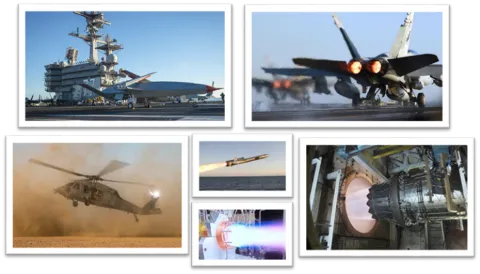
Naval aviation creates several unique demands on aircraft power and propulsion systems. The operation from carriers and other ships requires higher thrust to both weight and airflow engines in highly integrated inlet and exhaust systems, along with greater variability in throttle settings and the need for more rapid throttle excursions for landing, wave-off and bolter events.
Propulsion systems and their associated power and thermal management sub-systems are critical to the performance, operability, readiness and life-cycle costs of naval air vehicles. Specifically, the speed and range of fighter and strike aircraft are strongly dependent on gas-turbine engines and their specific thrust and fuel efficiency. In addition, turbine-propulsion systems are the primary fleet-readiness driver and the largest cost in operational systems. Improvements in these propulsion-related systems have the greatest potential to increase aircraft range, speed operability, readiness and other positive mission capabilities while reducing life-cycle costs.
A current focus area is Next Generation Propulsion Enablers (NGP-E). Advancements in integrated propulsion, power and thermal managements are essential to meet desired warfighter needs for future carrier-based tactical fighter and strike aircraft.
The most expensive portion of a weapons life cycle is the sustainment phase and gas turbine engines contain some of the shortest life-limited parts in the system. This program seeks technology solutions to help reduce these costs. This can include technologies to increase part life, inspection techniques and repairs.
Research Concentration Areas
Propulsion focus areas will provide innovative research and technology in aircraft and weapons propulsion and combined-power propulsion for high speed, long endurance and responsiveness. And basic and applied research investments in advanced thermodynamics cycles, engine/airframe integration, turbo-machinery and drive systems for enhanced performance and maintainability; advanced hot-section materials and coatings; small unmanned aerial vehicle propulsion and thermal management; and technologies to mitigate operations in austere environments.
NGP enablers focus on maximum efficiency and specific thrust over a wide range of engine-operating conditions. Technology challenges include variable- and adaptive-integrated propulsion, power and thermal management, aerodynamics, aeromechanics, instrumentation, supervisory control, mechanical durability, high-temperature materials, turbine-heat transfer, and highly integrated inlets and exhausts.
Research Challenges and Opportunities
- Advanced thermodynamic cycles, including pressure-gain combustion
- Engine-airframe integration, including serpentine inlets and active- and/or passive-flow control
- Advanced, high-stage loading and efficient turbomachinery, including tip flows, casing treatments, distortion-tolerant fans and advanced methods in blade-disk aeromechanics
- Advanced cooling and thermal management for engines and auxiliary systems, including new concepts of heat collection, distribution and rejection
- Advanced materials, coatings and manufacturing science for hot- and cold-section engine components in naval environments. Durable thermal/environmental coatings for harsh, austere environments. Ceramic-matrix composites for naval-unique operating conditions
- Component interactions in steady and transient operations, including seals, bearings, engine auxiliaries and externals
- Power and/or propulsion for small, unmanned air vehicles, including small combustors, micro-heat transfer, bearings and other small gas-turbine and reciprocating-engine components critical for such applications, including hybrid turbo-electric concepts
- Other areas leading to more power-dense, efficient, responsive, reliable and integrated power, propulsion and thermal-management systems
- Aerodynamics, aero-mechanics and control of variable/adaptive-engine technologies
- Adaptive fan technologies
- Supervisory control of adaptive-integrated propulsion, power and thermal management
- Ultra-high, power-density power and thermal managements
- Research relative to improved readiness and reduced life-cycle costs can address surface coatings and treatments for improved durability and wear resistance, damage measurement and inspection techniques, and Foreign Object Debris (FOD) resistance and detection
How to Submit
For detailed application and submission information for this research topic, please refer to our broad agency announcement (BAA) No. N0001425SB001.
Contracts: All white papers and full proposals for contracts must be submitted through the ONR Submission Portal; instructions are included in the BAA.
Grants: All white papers for grants must be submitted through the ONR Submission Portal, and full proposals for grants must be submitted through grants.gov; instructions are included in the BAA.

